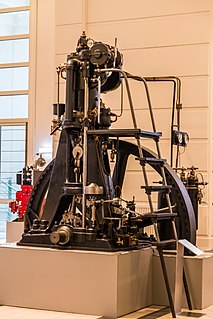
The diesel engine, named after Rudolf Diesel, is an internal combustion engine in which ignition of the fuel is caused by the elevated temperature of the air in the cylinder due to mechanical compression; thus, the diesel engine is a so-called compression-ignition engine. This contrasts with engines using spark plug-ignition of the air-fuel mixture, such as a petrol engine or a gas engine.

The Porsche 912 is a sports car produced by Porsche AG of Stuttgart, Germany, for the 1965 through 1969 model years. An entry-level variant of the 911, it was also offered in compact 2+2 Coupé and Targa body styles. The nimble-handling 912 was a fitted with a 1.6-liter air cooled 4-cylinder flat-4 from the last of the 356s, slightly detuned to 102 SAE horsepower at 5800 rpm. The 912's high-efficiency boxer engine, low drag, and low weight allow it to get up to 30 miles per US gallon. Priced at $4,700, more than 32,000 912s were built from April 1965 to July 1969. Sales of the 912 initially outpaced the 911, boosting the manufacturer's total production until success of the 911 was assured.

Porsche 997 is the internal designation for the Porsche 911 sports car manufactured and sold by German manufacturer Porsche between 2004 and 2013. Production of the Carrera and Carrera S coupés began in early 2004, all-wheel drive Carrera 4 and Carrera 4S began to be delivered to customers in November 2005, the Turbo and GT3 derivatives went on sale in late 2006 and the GT2 in 2007. In addition to the coupé and cabriolet versions, Targa versions of the Carrera 4 and Carrera 4S were also available, which carry on with the "glass canopy" roof design used since its first application on the 993 until the 991, which reverted to the classic targa top layout used on the early 911 Targas.

The Porsche 964 is the company's internal name for the Porsche 911 manufactured and sold between 1989 and 1994. Designed by Benjamin Dimson through January 1986, it featured significant styling revisions over previous 911 models, most prominently the more integrated bumpers. It was the first car to be offered with Porsche's Tiptronic automatic transmission and all wheel drive as options.

In internal combustion engines, variable valve timing (VVT) is the process of altering the timing of a valve lift event, and is often used to improve performance, fuel economy or emissions. It is increasingly being used in combination with variable valve lift systems. There are many ways in which this can be achieved, ranging from mechanical devices to electro-hydraulic and camless systems. Increasingly strict emissions regulations are causing many automotive manufacturers to use VVT systems.

The BMW M10 is an SOHC four-cylinder petrol engine which was produced from 1962-1988. It was BMW's first four-cylinder engine since the BMW 309 ended production in 1936 and was introduced in the New Class sedans.
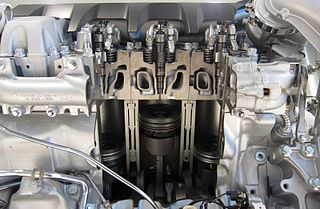
Common rail direct fuel injection is a direct fuel injection system built around a high-pressure fuel rail feeding solenoid valves, as opposed to a low-pressure fuel pump feeding unit injectors. High-pressure injection delivers power and fuel consumption benefits over earlier lower pressure fuel injection, by injecting fuel as a larger number of smaller droplets, giving a much higher ratio of surface area to volume. This provides improved vaporization from the surface of the fuel droplets, and so more efficient combining of atmospheric oxygen with vaporized fuel delivering more complete combustion.

The Cummins B Series is a family of diesel engines produced by American manufacturer Cummins. In production since 1984, the B series engine family is intended for multiple applications on and off-highway, light-duty, and medium-duty. In the automotive industry, it is best known for its use in school buses, public service buses in the United Kingdom, and Dodge/Ram pickup trucks.
Jetronic is a trade name of a manifold injection technology for automotive petrol engines, developed and marketed by Robert Bosch GmbH from the 1960s onwards. Bosch licensed the concept to many automobile manufacturers. There are several variations of the technology offering technological development and refinement.

An engine control unit (ECU), also commonly called an engine control module (ECM), is a type of electronic control unit that controls a series of actuators on an internal combustion engine to ensure optimal engine performance. It does this by reading values from a multitude of sensors within the engine bay, interpreting the data using multidimensional performance maps, and adjusting the engine actuators. Before ECUs, air–fuel mixture, ignition timing, and idle speed were mechanically set and dynamically controlled by mechanical and pneumatic means.
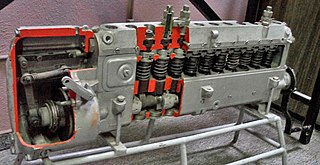
An Injection Pump is the device that pumps fuel into the cylinders of a diesel engine. Traditionally, the injection pump was driven indirectly from the crankshaft by gears, chains or a toothed belt that also drives the camshaft. It rotates at half crankshaft speed in a conventional four-stroke diesel engine. Its timing is such that the fuel is injected only very slightly before top dead centre of that cylinder's compression stroke. It is also common for the pump belt on gasoline engines to be driven directly from the camshaft. In some systems injection pressures can be as high as 620 bar.

Motronic is the trade name given to a range of digital engine control units developed by Robert Bosch GmbH which combined control of fuel injection and ignition in a single unit. By controlling both major systems in a single unit, many aspects of the engine's characteristics can be improved.

Porsche has been successful in many branches of motorsport of which most have been in long-distance races.

Electronic Diesel Control is a diesel engine fuel injection control system for the precise metering and delivery of fuel into the combustion chamber of modern diesel engines used in trucks and cars.
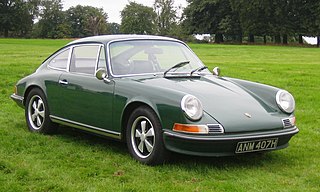
The original Porsche 911 is a luxury sports car made by Porsche AG of Stuttgart, Germany. A prototype of the famous, distinctive, and durable design was shown to the public in autumn 1963. Production began in September 1964 and continued through 1989. It was succeeded by a modified version, internally referred to as Porsche 964 but still sold as Porsche 911, as are current models.

The Porsche 991 is the internal designation for the seventh generation of the Porsche 911 sports car, which was unveiled at the 2011 Frankfurt Motor Show on 15 September as the replacement for the 997. The 991 was an entirely new platform, only the third since the original 911 launched in 1963. Production of the 991 generation ended on December 20, 2019, with 233,540 units produced.

The Porsche 911 is a two-door 2+2 high performance rear-engined sports car introduced in September 1964 by Porsche AG of Stuttgart, Germany. It has a rear-mounted flat-six engine and originally a torsion bar suspension. The car has been continuously enhanced through the years but the basic concept has remained unchanged. The engines were air-cooled until the introduction of the 996 series in 1998.
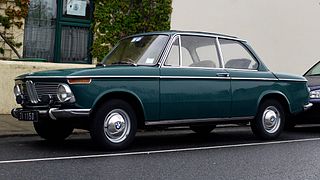
The BMW 02 Series is a range of compact executive cars produced by German automaker BMW between 1966 and 1977, based on a shortened version of the New Class Sedans.
Manifold injection is a mixture formation system for internal combustion engines with external mixture formation. It is commonly used in engines with spark ignition that use petrol as fuel, such as the Otto engine, and the Wankel engine. In a manifold-injected engine, the fuel is injected into the intake manifold, where it begins forming a combustible air-fuel mixture with the air. As soon as the intake valve opens, the piston starts sucking in the still forming mixture. Usually, this mixture is relatively homogeneous, and, at least in production engines for passenger cars, approximately stoichiometric; this means that there is an even distribution of fuel and air across the combustion chamber, and enough, but not more air present than what is required for the fuel's complete combustion. The injection timing and measuring of the fuel amount can be controlled either mechanically, or electronically. Since the 1970s and 1980s, manifold injection has been replacing carburettors in passenger cars. However, since the late 1990s, car manufacturers have started using petrol direct injection, which caused a decline in manifold injection installation in newly produced cars.

















